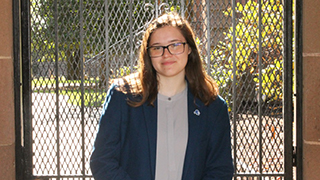Seven Study Habits to Put Into Practice Now: Tips From a Behavior Analyst
Tuesday, November 14, 2023
 It’s November; time for harvest festivals, the coming of the holiday season, and gathering
with family and friends. It’s also time for the realization that the academic semester
is coming to a quick end, and the fear that sets in when you realize you have put
off studying and working on course projects since September. Before you panic, take
a look at these seven, research supported studying tips from the field of behavior
analysis. If followed consistently, they are sure to help you succeed in your current
classes and in the future!
It’s November; time for harvest festivals, the coming of the holiday season, and gathering
with family and friends. It’s also time for the realization that the academic semester
is coming to a quick end, and the fear that sets in when you realize you have put
off studying and working on course projects since September. Before you panic, take
a look at these seven, research supported studying tips from the field of behavior
analysis. If followed consistently, they are sure to help you succeed in your current
classes and in the future!
1. Dedicate a study space. Our behavior is controlled by objects and people in our surroundings. If you want to do a specific behavior without being tempted by interfering behaviors, set up an environment where you only allow yourself to do the desired behavior in that location. Do not allow yourself to do anything else in that environment! For example, go to the library and sit at a cubical desk every time you want to study. Once you are at the desk, do not allow yourself to do anything else but study. If you want to check social media, eat a doughnut, or make a phone call, you have to leave the library to do those things and then return to the desk to study.
2. Schedule by product not by time or outcome. We are only in control of our actions, not the outcome or the passage of time. So, if you want to make a weekly schedule for studying, focus only on the behavior that you want to do; because that is what you can make happen. For example, schedule your studying by number of chapters read ("On Monday I will read 2 chapters in psychology"), or number of pages written ("On Tuesday I will write at least 5 pages of my term paper") rather than saying "I will study for 1 hour" or "I will study in order to get an A on the exam." Scheduling by time does not ensure what you will be doing in that time and don’t worry about the outcome. If you complete the work that you scheduled yourself to complete, you are likely to get an A as the outcome.
3. Reward small steps not the final product. If you want something to increase, you need to reward it. In behavior analysis we call this the principle of reinforcement. If you give yourself a reward after you do a behavior, you are more likely to do that behavior again in the future. So, if you want to study, you need to reward your studying behavior. Allow yourself to buy a Starbucks, but only after you write 5 pages of your paper. Go on social media for 20 minutes, but only after reading at least half a psychology chapter. Reward each step along the way, do not wait until the end to reinforce your finishing of a course or earning of a degree. So, instead of "keeping your eye on the prize," keep rewarding the small steps that ultimately earn the prize!
4. Start the chain of behavior. An object in motion will stay in motion unless influenced by another force. So…put your studying into motion and you are more likely to keep going. For example, before you leave your house or your dorm room in the morning, put your textbook in your bag. Then, before going home after class, go to the bathroom in the library. It may sound weird, but you are now standing in the library with your textbook handy, 2 steps towards studying. Now you only need to walk to a desk and get started. If, however, your plan is to stop by your dorm room after class to get your textbook, you will probably skip studying that day.
5. To work in a group or not. Many students think it’s beneficial to form study/work groups instead of working on their own. Research tells us that this is true in some circumstances but not in others. Working in groups is only beneficial when every person in the group knows how to manage their own behavior. If someone is not good at managing their own behavior, they will likely distract the group from its goal. So, before forming a study/work group, make sure all members of the group read this article!
6. Avoid "Bootleg" reinforcement. What is bootleg reinforcement you might ask? It is when you give yourself a reward even though you didn’t earn it. It happens all the time. We make excuses for why we should get something even though we don’t deserve it. For example, you decide to allow yourself a Starbucks only if you finish your philosophy paper. Then, although you didn’t finish your paper, your friend buys you a Starbucks and brings it to the dorm room for you. Do you make an excuse and drink it ("I feel bad that she spent the money already," "Well, I am almost done with the paper.")? If you do, you will be less likely to finish your paper and also less likely to complete your work in the future! Instead, you should politely say "Thanks, can you put that in the fridge? I can’t have it until I finish up my paper." Then write your paper.
7. Slow and steady gets the A. Stop cramming for exams and completing projects all in one night. That style of studying does not make behavioral sense. Instead, study a little bit every night…do a course project in stages over the course of a week. Then, provide yourself with a reward for each small step. Not only will the work be more pleasurable, but you will also retain the knowledge more than using an all-at-once cramming style.
I hope these study tips help you complete your papers and pass your exams this semester and in all future semesters. Be on the lookout for future Tips from a Behavior Analyst that will help you succeed in your everyday goals through the principles of behavior analysis!
If you would like to learn more about the field of applied behavior analysis (ABA) and about the ABA graduate program options here at Seton Hall University, please reach out to Frank Cicero, Ph.D. at frank.cicero@shu.edu.
Categories: Education






